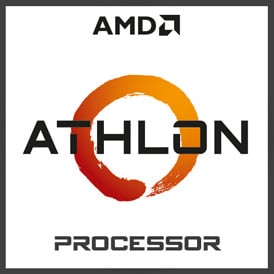
Compare AMD Epyc Embedded 3451 VS AMD Athlon Silver Pro 3125GE. Which processor delivers superior performance?
In this detailed comparison, we evaluate the specifications and benchmarks of both processors to determine the best choice for your needs. We analyze their core counts, maximum frequencies, and power consumption.
AMD Epyc Embedded 3451 boasts a maximum frequency of 2.14 GHz GHz. 16 / 32 cores that enhance multitasking capabilities.With a power consumption of 100 W W, it ensures efficient performance.Released in Q1/2018, it incorporates the latest technology for optimal efficiency.
AMD Athlon Silver Pro 3125GE features a maximum frequency of 3.40 GHz GHz. 2 / 4 cores designed for high-performance tasks.Its power consumption is 35 W W, providing a balance of power and efficiency.Launched in Q3/2020, it is built to handle demanding applications.
 Reasons to consider
Reasons to consider More number of cores
14 times more cores
Common positions AMD Epyc Embedded 3451 CPU in popular benchmarks, for comparison with other models.
 Reasons to consider
Reasons to consider Higher clock speed
Around 37% better clock speed
Performance per watt
About 0.35 times less performance per watt
Common positions AMD Athlon Silver Pro 3125GE CPU in popular benchmarks, for comparison with other models.
 AMD Epyc Embedded 3451
AMD Epyc Embedded 3451

Comprehensive background on the processors being compared, detailing their series, generation, and targeted market segment.
Essential parameters including the number of cores, threads, base and turbo frequencies, and cache size. These metrics provide insight into the processor’s speed—higher values generally indicate better performance.
The integrated graphics (iGPU) do not influence the CPU performance significantly; they serve as a substitute for a dedicated graphics card in the absence of one or are utilized in mobile devices.
This section details the built-in codecs used for encoding and decoding media content, which significantly enhance processing speed and efficiency.
Overview of the types and quantities of RAM supported by AMD Athlon Silver Pro 3125GE and AMD Epyc Embedded 3451. The supported memory frequencies may vary depending on the motherboard configuration.
Analyze the TDP (Thermal Design Power) requirements of AMD Epyc Embedded 3451 and AMD Athlon Silver Pro 3125GE to make an informed decision on the appropriate cooling system. Remember that TDP refers to thermal watts, not electrical watts.
Information on architecture, interfaces, and additional instructions supported by AMD Epyc Embedded 3451 and AMD Athlon Silver Pro 3125GE, including virtual machine technologies and fabrication processes.
By analyzing the results from various benchmarks, you can gain a clearer understanding of the performance differences between AMD Epyc Embedded 3451 and AMD Athlon Silver Pro 3125GE.
Compare the synthetic benchmark scores and make an informed decision on the best processor for your needs!